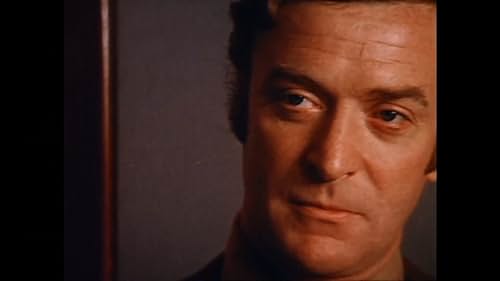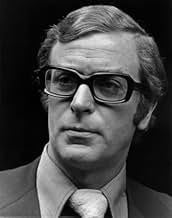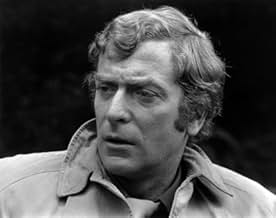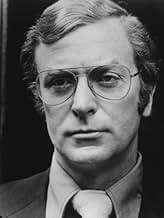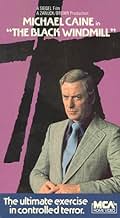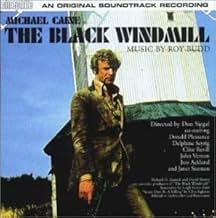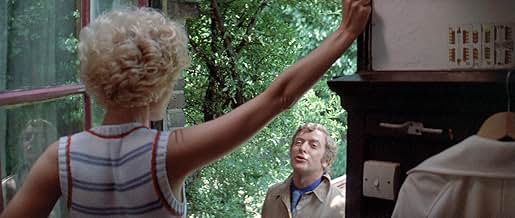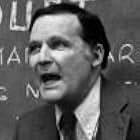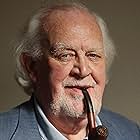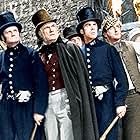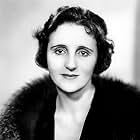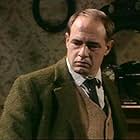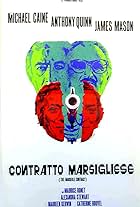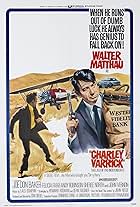VALUTAZIONE IMDb
6,3/10
3456
LA TUA VALUTAZIONE
Il figlio di un agente britannico viene rapito e tenuto in ostaggio.Il figlio di un agente britannico viene rapito e tenuto in ostaggio.Il figlio di un agente britannico viene rapito e tenuto in ostaggio.
Trama
Lo sapevi?
- QuizThe windmills seen in the film are "The Clayton Windmills". Wikipedia states that they are "known locally as Jack and Jill, (and) stand on the South Downs above the village of Clayton, West Sussex, England. They comprise a post mill and a tower mill, and the roundhouse of a former post mill. All three are "Grade II listed buildings."
- BlooperAt the start of the film where the van is blown up on the motorway, it becomes clear that the scene is filmed on an incomplete stretch of motorway (possibly the M3, which was completed in 1974) as lane markings are missing from one carriageway.
- Citazioni
Cedric Harper: He knew my name and he knew the name of this department. Both of these things imply serious breaches of security.
- Curiosità sui creditiThe opening credits are formed from images of children's alphabet blocks.
- ConnessioniReferences Tutti insieme appassionatamente (1965)
- Colonne sonoreUnderneath the Spreading Chestnut Tree
(uncredited)
(trad.)
Recensione in evidenza
I caught this film when it was shown on British television recently and was surprised that I had never previously heard of it, despite the fact that it stars an actor as iconic as Michael Caine and was made by a director as famous as Don Siegel. The "black windmill" of the title is one of the two Clayton Windmills (known locally as "Jack and Jill") on the South Downs near Brighton; this windmill plays an important part in the plot.
As in "The Ipcress File", Caine plays a British secret service agent, but his character here, John Tarrant, is very different to Harry Palmer. Whereas Palmer was a working-class outsider, a former Army sergeant who was virtually blackmailed into joining the secret service to avoid a criminal charge, Tarrant is an establishment insider, part of the officer class. (He holds the rank of Major). He is engaged in an undercover operation to counter the activities of a gang of arms smugglers selling weapons to terrorists in Northern Ireland. (The film was made in 1974 when the Northern Irish troubles were at their height).
The film starts with Tarrant's young son David being kidnapped and held to ransom. The kidnappers appear to have a detailed knowledge not only of Tarrant's family circumstances but also of the work he is engaged on; as their ransom they demand a valuable quantity of uncut diamonds which he has recently acquired to fund his intelligence work. Tarrant initially believes that the kidnappers are connected either to the arms dealers or to the terrorists for whom they are working, and confides in his superior, Cedric Harper. As matters progress, however, he begins to wonder whether matters are really as they seem and whether he can really trust his colleagues.
This is far from being Caine's worst film. (For an actor of his distinction he made more than his fair share of dreadful ones, "Blame It on Rio" and "Ashanti" being two that come to mind). It does, however, highlight one of his weaknesses as an actor, namely that in the early part of his career he was not very good at conveying strong emotions. Most of his iconic roles, at least from this period, involved him playing characters who, for one reason or another, avoid showing much emotion. This could be because they need to keep up the "stiff upper lip" (his characters in "Zulu" and "Battle of Britain"), because they hide their feelings beneath a mask of impassivity (Jack Carter), because they deliberately avoid emotional commitment (Alfie Elkins) or because they try and distance themselves from their feelings through cynicism and irony (Frank in "Educating Rita"). Certainly, some of his more mature performances do show greater emotional depth, such as "The Honorary Consul" and "The Quiet American", but in "The Black Windmill" he is rather wooden, never suggesting the anguish and anxiety of a man whose son is being held for ransom.
Some of the acting is better; Janet Suzman as Tarrant's estranged wife Alex provides the emotional conviction that Caine's performance lacks, while Donald Pleasence is very effective as the smooth but unsympathetic and possibly duplicitous Harper. The film as a whole is a professionally made thriller, if not a very original one, but an essentially American director like Siegel was not the most natural choice to direct a British spy thriller like this one. "The Black Windmill" is never going to rank on his filmography as highly as the likes of "Dirty Harry" and "The Shootist". 6/10
As in "The Ipcress File", Caine plays a British secret service agent, but his character here, John Tarrant, is very different to Harry Palmer. Whereas Palmer was a working-class outsider, a former Army sergeant who was virtually blackmailed into joining the secret service to avoid a criminal charge, Tarrant is an establishment insider, part of the officer class. (He holds the rank of Major). He is engaged in an undercover operation to counter the activities of a gang of arms smugglers selling weapons to terrorists in Northern Ireland. (The film was made in 1974 when the Northern Irish troubles were at their height).
The film starts with Tarrant's young son David being kidnapped and held to ransom. The kidnappers appear to have a detailed knowledge not only of Tarrant's family circumstances but also of the work he is engaged on; as their ransom they demand a valuable quantity of uncut diamonds which he has recently acquired to fund his intelligence work. Tarrant initially believes that the kidnappers are connected either to the arms dealers or to the terrorists for whom they are working, and confides in his superior, Cedric Harper. As matters progress, however, he begins to wonder whether matters are really as they seem and whether he can really trust his colleagues.
This is far from being Caine's worst film. (For an actor of his distinction he made more than his fair share of dreadful ones, "Blame It on Rio" and "Ashanti" being two that come to mind). It does, however, highlight one of his weaknesses as an actor, namely that in the early part of his career he was not very good at conveying strong emotions. Most of his iconic roles, at least from this period, involved him playing characters who, for one reason or another, avoid showing much emotion. This could be because they need to keep up the "stiff upper lip" (his characters in "Zulu" and "Battle of Britain"), because they hide their feelings beneath a mask of impassivity (Jack Carter), because they deliberately avoid emotional commitment (Alfie Elkins) or because they try and distance themselves from their feelings through cynicism and irony (Frank in "Educating Rita"). Certainly, some of his more mature performances do show greater emotional depth, such as "The Honorary Consul" and "The Quiet American", but in "The Black Windmill" he is rather wooden, never suggesting the anguish and anxiety of a man whose son is being held for ransom.
Some of the acting is better; Janet Suzman as Tarrant's estranged wife Alex provides the emotional conviction that Caine's performance lacks, while Donald Pleasence is very effective as the smooth but unsympathetic and possibly duplicitous Harper. The film as a whole is a professionally made thriller, if not a very original one, but an essentially American director like Siegel was not the most natural choice to direct a British spy thriller like this one. "The Black Windmill" is never going to rank on his filmography as highly as the likes of "Dirty Harry" and "The Shootist". 6/10
- JamesHitchcock
- 6 ott 2011
- Permalink
I più visti
Accedi per valutare e creare un elenco di titoli salvati per ottenere consigli personalizzati
- How long is The Black Windmill?Powered by Alexa
Dettagli
Botteghino
- Budget
- 1.500.000 USD (previsto)
Contribuisci a questa pagina
Suggerisci una modifica o aggiungi i contenuti mancanti

Divario superiore
By what name was Il caso Drabble (1974) officially released in India in English?
Rispondi
